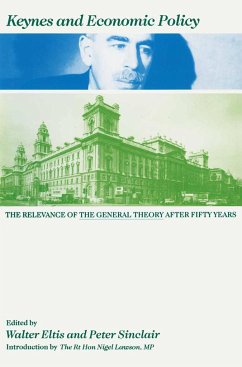- Broschiertes Buch
- Merkliste
- Auf die Merkliste
- Bewerten Bewerten
- Teilen
- Produkt teilen
- Produkterinnerung
- Produkterinnerung
A collection of papers on the relevance of Keynes' economic theory after 50 years. It covers a diversity of topics relating the theory to subjects varying from the effect of fiscal reflation upon employment, and the significance of public sector borrowing to the international dimension.
Andere Kunden interessierten sich auch für
![Economic Theory and Social Justice Economic Theory and Social Justice]() Giancarlo GandalfoEconomic Theory and Social Justice108,99 €
Giancarlo GandalfoEconomic Theory and Social Justice108,99 €![Economic Theory and Social Justice Economic Theory and Social Justice]() Economic Theory and Social Justice75,99 €
Economic Theory and Social Justice75,99 €![The Eclipse of Keynesianism The Eclipse of Keynesianism]() Robert LeesonThe Eclipse of Keynesianism56,99 €
Robert LeesonThe Eclipse of Keynesianism56,99 €![Third Way Economics Third Way Economics]() P. WhymanThird Way Economics75,99 €
P. WhymanThird Way Economics75,99 €![Third Way Economics Third Way Economics]() P. WhymanThird Way Economics75,99 €
P. WhymanThird Way Economics75,99 €![Economic Theory, Welfare and the State Economic Theory, Welfare and the State]() A. AsimakopulosEconomic Theory, Welfare and the State38,99 €
A. AsimakopulosEconomic Theory, Welfare and the State38,99 €![The Eclipse of Keynesianism The Eclipse of Keynesianism]() R. LeesonThe Eclipse of Keynesianism38,99 €
R. LeesonThe Eclipse of Keynesianism38,99 €-
-
-
A collection of papers on the relevance of Keynes' economic theory after 50 years. It covers a diversity of topics relating the theory to subjects varying from the effect of fiscal reflation upon employment, and the significance of public sector borrowing to the international dimension.
Produktdetails
- Produktdetails
- Verlag: Palgrave Macmillan / Palgrave Macmillan UK / Springer Palgrave Macmillan
- Artikelnr. des Verlages: 978-1-349-10340-9
- 1st ed. 1988
- Seitenzahl: 473
- Erscheinungstermin: 1. Januar 1988
- Englisch
- Abmessung: 234mm x 156mm x 25mm
- Gewicht: 738g
- ISBN-13: 9781349103409
- ISBN-10: 1349103403
- Artikelnr.: 44461980
- Herstellerkennzeichnung
- Libri GmbH
- Europaallee 1
- 36244 Bad Hersfeld
- gpsr@libri.de
- Verlag: Palgrave Macmillan / Palgrave Macmillan UK / Springer Palgrave Macmillan
- Artikelnr. des Verlages: 978-1-349-10340-9
- 1st ed. 1988
- Seitenzahl: 473
- Erscheinungstermin: 1. Januar 1988
- Englisch
- Abmessung: 234mm x 156mm x 25mm
- Gewicht: 738g
- ISBN-13: 9781349103409
- ISBN-10: 1349103403
- Artikelnr.: 44461980
- Herstellerkennzeichnung
- Libri GmbH
- Europaallee 1
- 36244 Bad Hersfeld
- gpsr@libri.de
Part 1 The adequacy of market forces for the achievement of high employment: are market forces adequate to maintain full employement - if not, can demand management policies be relied upon to fill the gap, Jo Artis; the role of demand management in the maintenance of full employment, Bennett McCallum. Part 2 Money, wages and employment: wages and unemployment half a century on; Patrick Minford; wages and economic activity, Stephen Nickell. Part 3 The effect of fiscal reflation upon employment: the effect of fiscal reflation upon employment, Francis Breddon, Alan Budd et al; aspects of the theory of fiscal policy, Maurice Preston. Part 4 The inflationary impact of fiscal policy : inflation and fiscal expansion, Christopher Taylor; is fiscal expansion inflationary, Peter Sinclair; Part 5 The significance of public sector borrowing: government deficits and debts - the necessity and cost of adjustment - the case of Italy, Giampaolo Galli and Rainer Masera; measures of fiscal stance and rules for stabilizing the economy - the case for separating measurement from policy, Marcus Miller and Alan Sutherland. Part 6 Policy to control interest rates: interest rates and macroeconomic policy, J. Flemming; interest rates and the conduct of monetary policy, Geoffrey Wood. Part 7 Should reflationary fiscal policy have priority over monetary policy: Monetary and fiscal policy in the UK, Alan A.Walters; Should fiscal policy rule the roost - the coordination of monetary and fiscal policy, David Currie. Part 8 Keynesian policy in a historical context: Keynes on interwar economic policy, N.H.Dimsdale; Keynes and the TUC in the 1930s and the 1980s, Bill Callaghan; Keynesian and other explanations of post-war macro-economic trends, R.C.O.Matthews and A.Bowen. Part 9 The international dimension : how valid is international Keynesianism, Max Corden. Part 10 Keynes and UK and German economic policy: the irrelevance of Keynes to German economic policy and to international economic cooperationin the 1980s, Ernst Helmstadter; the UK government's financial strategy , Sir Terence Burns. Conclusion: The continuing relevance of Keynes to economic policy, Walter Eltis.
Part 1 The adequacy of market forces for the achievement of high employment: are market forces adequate to maintain full employement - if not, can demand management policies be relied upon to fill the gap, Jo Artis; the role of demand management in the maintenance of full employment, Bennett McCallum. Part 2 Money, wages and employment: wages and unemployment half a century on; Patrick Minford; wages and economic activity, Stephen Nickell. Part 3 The effect of fiscal reflation upon employment: the effect of fiscal reflation upon employment, Francis Breddon, Alan Budd et al; aspects of the theory of fiscal policy, Maurice Preston. Part 4 The inflationary impact of fiscal policy : inflation and fiscal expansion, Christopher Taylor; is fiscal expansion inflationary, Peter Sinclair; Part 5 The significance of public sector borrowing: government deficits and debts - the necessity and cost of adjustment - the case of Italy, Giampaolo Galli and Rainer Masera; measures of fiscal stance and rules for stabilizing the economy - the case for separating measurement from policy, Marcus Miller and Alan Sutherland. Part 6 Policy to control interest rates: interest rates and macroeconomic policy, J. Flemming; interest rates and the conduct of monetary policy, Geoffrey Wood. Part 7 Should reflationary fiscal policy have priority over monetary policy: Monetary and fiscal policy in the UK, Alan A.Walters; Should fiscal policy rule the roost - the coordination of monetary and fiscal policy, David Currie. Part 8 Keynesian policy in a historical context: Keynes on interwar economic policy, N.H.Dimsdale; Keynes and the TUC in the 1930s and the 1980s, Bill Callaghan; Keynesian and other explanations of post-war macro-economic trends, R.C.O.Matthews and A.Bowen. Part 9 The international dimension : how valid is international Keynesianism, Max Corden. Part 10 Keynes and UK and German economic policy: the irrelevance of Keynes to German economic policy and to international economic cooperationin the 1980s, Ernst Helmstadter; the UK government's financial strategy , Sir Terence Burns. Conclusion: The continuing relevance of Keynes to economic policy, Walter Eltis.









